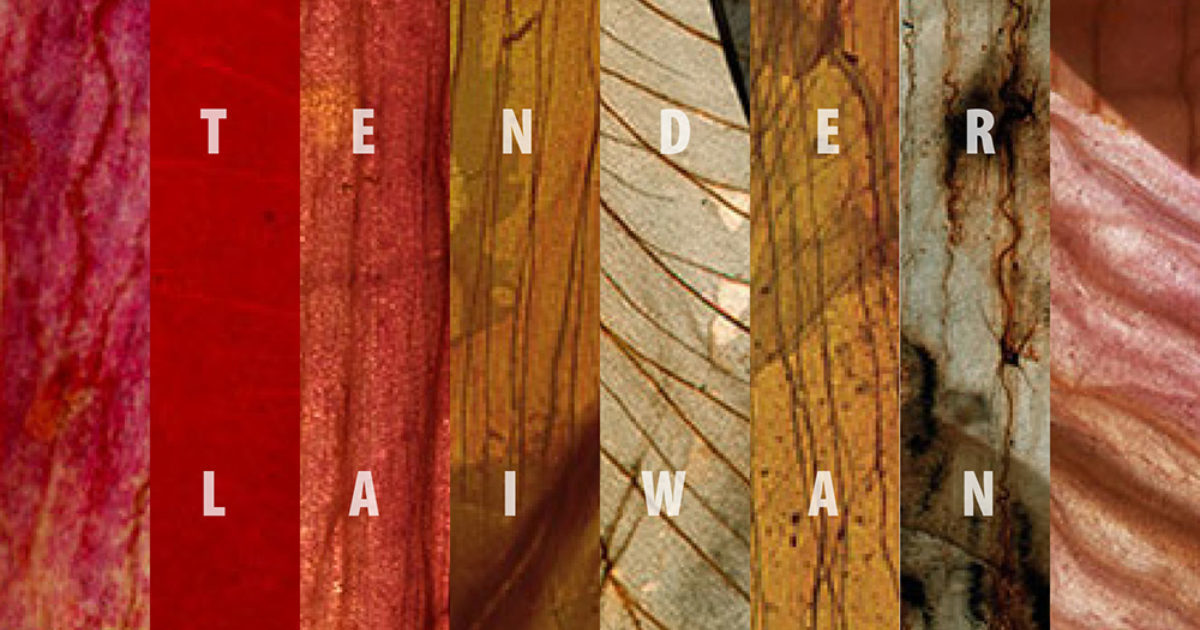
TENDER
Laiwan
Talon Books, 2020
Review by Clayton Longstaff
Laiwan’s poetry takes root in the most hostile of urban landscapes, and breathes deep. In breathing, it becomes a living force in the felled detritus of capitalistic and colonial wreckage. From this wreckage rises TENDER, and around it, an entire forest of feeling follows.
“[F]ierce defence and ferocious vulnerability[.]” These are words the poet uses in her “ode to a ferocious thistle”, though no five words could better describe the spirit of the book as a whole. The poems that comprise TENDER were written over the span of thirty years by Vancouver-based interdisciplinary artist, writer, and educator, Laiwan. However, the words, images, and memories of this collection tell the history of an entire life lived in fierce defiance against the sexed, raced, and gendered faces of oppression. Before the publication of this book, Laiwan’s work had primarily been in performance, audio, and visual arts, focusing on decolonialization, as well as bodily and emotional ways of knowing. Although she continued to turn to poetry throughout her prolific career as an artist, up until now her literary works have only appeared in the occasional small press magazine. The readers at Mix, The Capilano Review, West Coast Line (now called Line), and Cube were among Laiwan’s first readership back in the ’90s.
If an interest in the philosophy of embodiment only began revealing itself around the year 2000, it appears to have always been present, even integral, in her approach to poetry. Throughout the book the interconnectedness of mind, body, and environment develop into a way of being with the world that is deeply synergetic with nature–freeing the human condition, finally, from the grips of a few centuries long Cartesian hangover. “If feeling is a language,” the speaker asks in the section titled on heroics, “how and what have I been taught to articulate?”
TENDER may surely be read as a return to feeling: “Remember feeling? Forget remembering … feel this” (“feeling”). But this is by no means a return to any real or imagined historical past. Instead, Laiwan’s TENDER illustrates an epistemological turn to the body as a source of meaning-making—what the poet calls “discovering the syntax of sensuality” (“a mythology from the earth”). Rather than shining a light into the past, Laiwan, to borrow a phrase from Thomas Cleary’s translation of The Secret of the Golden Flower, “turn[s] the light around.” Throughout the book, the poet leads her reader through memories, photographs, and words, deconstructing formal restrictions by refracting each poem into a kaleidoscope of content—past, present, and future. Punctuation is nearly completely eliminated, drawing attention to the reader’s position in the poem and how the aesthetic experience is created anew with every encounter. In this light, linearity with its capitalistic promise of progress is shattered to illustrate the multitudes contained in every present moment. The idea of being submerged in meaningful sensuality is captured wonderfully in an image of the ocean, crashing against the austere walls of a “one-eyed Cycloptian lighthouse”:
With a laser Cycloptian eye, it scans for data while surveillantly
adapting my every move to an informaniacal tarantella, with a heartless and futile pace.
I long for lung. Clear lung. Clarity. Not the moist, thick fog of a pneumonic
constriction guided by the plaintive warning of a one-eyed Cycloptian
lighthouse
(“LUNG: towards embodying”)
To follow the speaker of TENDER is to escape Cartesian espionage for a shelter amid the waves, where time and space are endlessly colliding in a cleansing performance of the present tense. Freed at once of all that strives to oppress, struggles to estrange, and motivates only to monopolize—freed by a single breath drawn by the lung, which speaks even when the voice doesn’t: “i am worth more than this” (“defiance”). Laiwan subverts bodily obsolescence by underscoring the corporeality essential to language, unifying the aesthetic experience with the sensual, the spiritual with the terrestrial. Myth and art are returned to the embodied company of language, enchanting the reader by turning them towards their own tenderness—the tenderness at the centre of all things.
In a poem titled “what is a park”, the speaker suggests that a park “is a reminder to wander without objective.” I believe that this, too, can now be said of TENDER. A book which reminds its reader to wander without objective, “for intimacy is new every time.”
Clayton Longstaff is a writer of poetry and prose living on unceded Lekwungen & W̱SÁNEĆ territory. His work has appeared, or is forthcoming, in publications including Soliloquies Anthology, Canadian Literature Magazine, Montreal Writes, Contemporary Verse 2, and elsewhere.